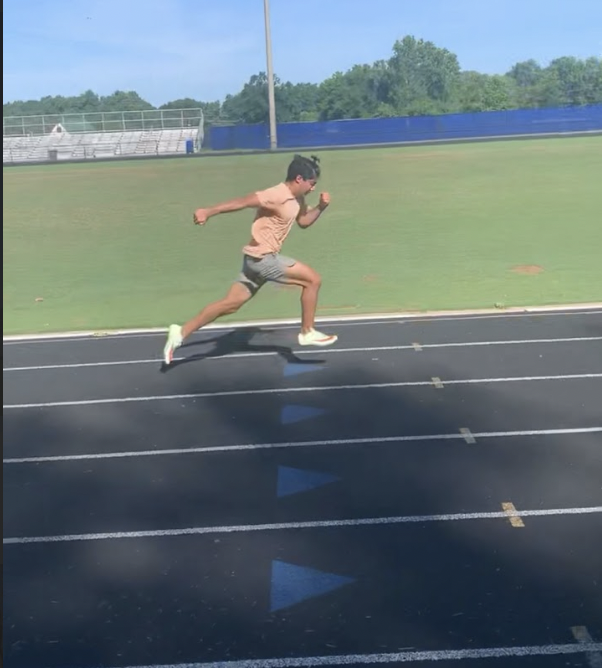Track and field vs cross country: which running sport is right for you?
Photo Courtesy of Arnav Juneja
Arnav Juneja bursts into a sprint at track practice. The WCHS junior trains for his third competitive season on the track & field team.
May 1, 2023
With the school year coming to a close, many students may be thinking about trying out for sports for the next school year. For students who love to run, track and field or cross country would be great choices. However, for those with little experience, it can be hard to know which sport to choose. Specifically, knowing the similarities and differences between track and field and cross country may help students decide which running sport is most suited to their abilities and what they are looking for.
Cross country is run in the fall season and track is run during the spring season. So while many students choose to do both, others choose only the sport they are more interested in. Junior Arnav Juneja participates in both sports, but focuses more on his track season as a mid-distance sprinter.
“Cross country is a really high volume of running and it’s a niche more specific to distance runners. It’s always a 5k, and for some people that’s a really good thing to do in the fall before winter track,” Juneja said. “Track is a lot more versatile. There are a lot more people that do cross country, but track is more serious, competitive running. There are a lot of different events, like field events, jumping, really short distances, and distances all the way up to 2 miles.”
There are even more differences besides the versatility of the events, according to junior Chiara Gancayco, who has been running cross country for four years and track for two. One notable dissimilarity is the terrain used in each sport. Cross country involves distance and endurance running, so the courses are much longer. As such, they travel through more scenic territory.
“Track is run on a track, but with cross country, you can run on different terrains,” Gancayco said. “You can be running in the woods, on grass, or over hills. One time, one of our races was on a golf course.”
The contrast between the terrains stems from a disparity in the volume of running in each sport. Because cross country is more endurance and track is more versatile, practices can look very different between the two sports.
“The biggest difference is the amount of running you do,” Juneja said. “For track, everyone is split up into different groups: throwers, jumpers, distance and sprinters will go do their own thing. For cross country, everyone does the same thing at the same time.”
Meets and races mirror the dynamics of practices. Practices are held six days a week for about an hour and a half, but with no specific end times. When meets or races are scheduled, they replace a practice for that day. Track meets reflect the more individualistic nature of the sport, while the team races together in cross country competitions.
“For track meets, everyone has their own event at different times. It’s a lot more individual, and you only compete with the people in your event,” Juneja said. “For cross country there is one event for everyone. It’s much more chaotic when there are 500 people at the start line. It’s like a free for all.”
Because of this track can be perceived as a somewhat more serious and competitive sport. The tryout process is more selective for track than cross country.
“For cross country, as long as you’re putting in effort and showing that you want to be at practice and improve, youll be a part of the team,” Gancayco said. “Track is more competitive. You get to pick what event you want to try out with. You have to get a cut time, but if you’re close and you put in effort, then the coach will likely let you come to practices, just maybe not compete yet.”
For people with limited experience, cross country is less pressure. It is more relaxed, there are less competitions, and in a big group it’s easy to find friends to run with.
“I would recommend cross country for beginners because if you were interested in running, it would prepare you for track,” Juneja said. “It’s a better introduction to running because there is no extreme pressure, it’s just more about self-improvement. Rather than will “I beat this person,”
you can see yourself getting better over time.”
But for people who love to run, both sports offer a wonderful opportunity to train and have fun at the same time. While there are differences between the two sports, whichever sport students are better suited for will be fulfilling and enjoyable.
“You get this feeling from running and competing. During the race, yes it can be painful, but you also love it at the same time,” Gancayco said. “And for both sports, a super amazing part is the team. The team is just super friendly and welcoming, it’s a really good community. And we all have fun!”


